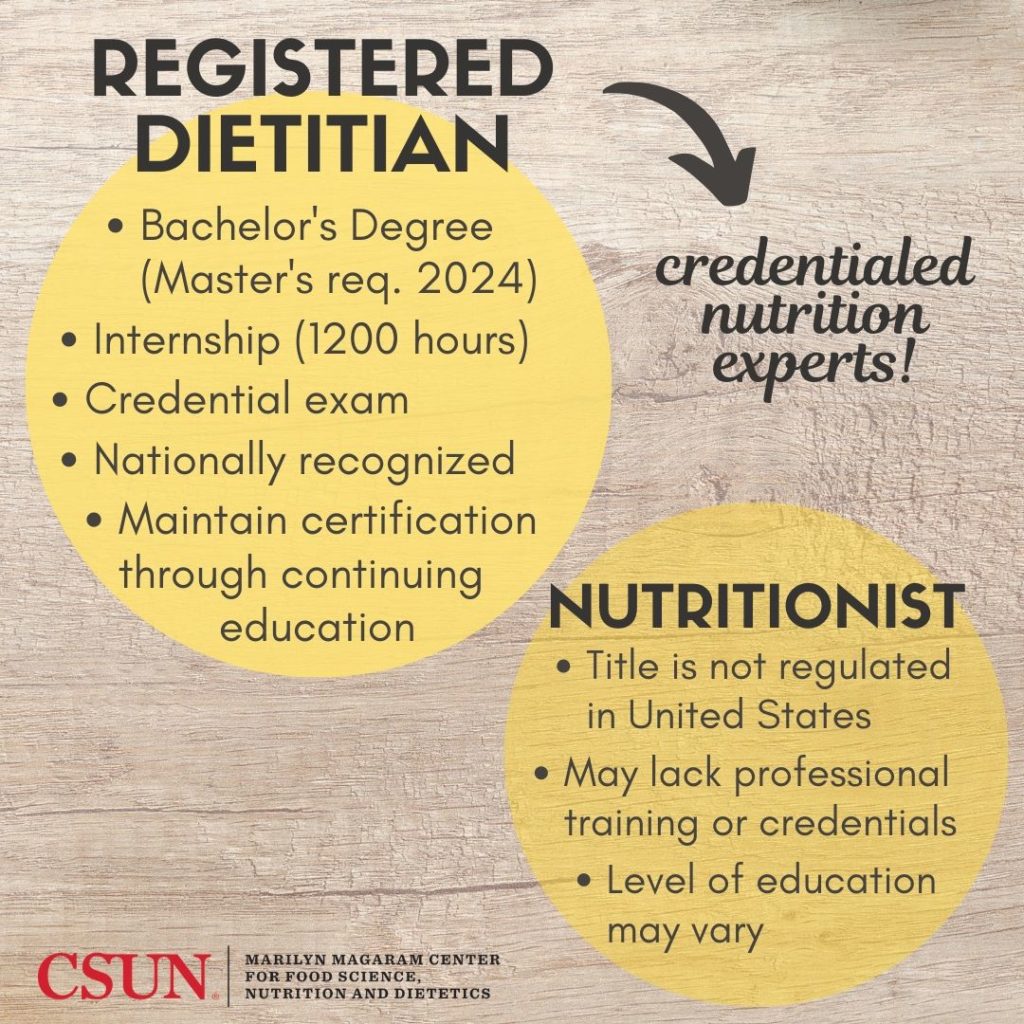By: Evangeline (Minying) Li, CSUN Dietetic Intern

Diet plays an essential role in chronic disease prevention and management. Nutrition counseling can help individuals meet their health goals and improve conditions such as diabetes, heart disease, and hypertension.1 The Marilyn Magaram Center (MMC) offers a variety of products and services to promote health and nutrition. Today, we are going to explore one of the most popular services at the MMC – Nutrition Counseling.
Nutrition Counseling is a personalized one-on-one counseling session with a Registered Dietitian Nutritionist (RDN). RDNs are health professionals that are knowledgeable in nutritional science, medical nutrition therapy and food science.2
Criteria to Become an RDN
Registered Dietitian Nutritionists are food and nutrition experts. According to the Academy of Nutrition and Dietetics2, to become a credentialed RDN an individual must complete the following:
- Hold a bachelor’s degree with coursework through an Accreditation Council for Education in Nutrition and Dietetics (ACEND) accredited program (in 2024, the minimum degree requirement will be a master’s degree)
- Complete an ACEND-accredited supervised practice program (1200 hours)
- Pass a national examination administered by the Commission on Dietetic Registration (CDR)
- Uphold continuing professional education requirements to maintain registration

Nutritionist vs. Dietitian
In the United States, the general term “nutritionist” is not regulated or protected.3 Only individuals that have met the RDN criteria listed above are credentialed as a “Registered Dietitian Nutritionist (RDN)” and/or “Registered Dietitian (RD),” which are interchangeable terms. When you visit an RDN, they will review your eating habits, lifestyle, and nutrition-related medical conditions. By having a thorough assessment of your health and nutritional status, an RDN would create a personalized nutrition plan just for you. The RDN will guide you and support you along the way.
How an RDN Can Help
According to the Academy of Nutrition and Dietetics4, common reasons to seek the help of an RDN include:
- Meal planning and preparation
- Digestive problems
- Individualized nutrition advice
- Understanding how food impacts health conditions, such as diabetes and high blood pressure
- Gastric bypass surgery considerations or management
- New mom, current pregnancy, or trying to conceive
- Learning to have a healthy relationship with food
- Trying to gain, lose, or maintain weight
- Caring for an aging parent
- Improve athletic performance
RDNs in Healthcare Teams
In a systematic review of type 2 diabetes prevention programs, interventions that included nutrition counseling by RDNs improved glucose levels, triglyceride levels, waist circumference and blood pressure.5 RDNs are critical members in healthcare teams as they provide on-going nutrition education and follow-up. In the pediatric population, RDNs assess the growth and development of children and can adjust eating behaviors for them.6 RDNs help individuals living with diabetes understand the relationship of food choices and blood sugar control.6
Online Nutrition Counseling Appointments Now Available
What nutrition-related goal(s) are a priority to you? For a limited time, FREE Nutrition Counseling sessions are available to everyone via one-on-one telehealth consults. To set up an appointment, email magaram.center@csun.edu
Contact us at magaram.center@csun.edu or (818) 677-3102 if you have specific questions on how a Registered Dietitian Nutritionist can support you in your health goals.
References
- Klemm S. RDNs and Medical Nutrition Therapy Services. EatRight. https://www.eatright.org/food/resources/learn-more-about-rdns/rdns-and-medical-nutrition-therapy-services. Published October 8, 2018. Accessed November 6, 2019.
- Academy of Nutrition and Dietetics. What is a Registered Dietitian Nutritionist. eatrightpro.org. https://www.eatrightpro.org/about-us/what-is-an-rdn-and-dtr/what-is-a-registered-dietitian-nutritionist. Accessed November 6, 2019.
- Nutrition Science Degree. What Is The Difference Between A Nutritionist And A Dietitian? Nutrition Science Degree. https://nutritionsciencedegree.org/what-is-the-difference-between-a-nutritionist-and-a-dietician/. Accessed November 6, 2019.
- Gordon B. 10 Reasons to Visit an RDN. EatRight. https://www.eatright.org/food/resources/learn-more-about-rdns/10-reasons-to-visit-an-rdn. Published August 2018. Accessed November 7, 2019.
- Raynor, H. A., Davidson, P. G., Burns, H., Nadelson, M. D. H., Mesznik, S., Uhley, V., & Moloney, L. (2017). Medical Nutrition Therapy and Weight Loss Questions for the Evidence Analysis Library Prevention of Type 2 Diabetes Project: Systematic Reviews. Journal of the Academy of Nutrition and Dietetics, 117(10), 1578–1611. doi: 10.1016/j.jand.2017.06.361
- Steinke, T. J., O’Callahan, E. L., & York, J. L. (2017). Role of a registered dietitian in pediatric type 1 and type 2 diabetes. Translational Pediatrics, 6(4), 365–372. doi: 10.21037/tp.2017.09.05
